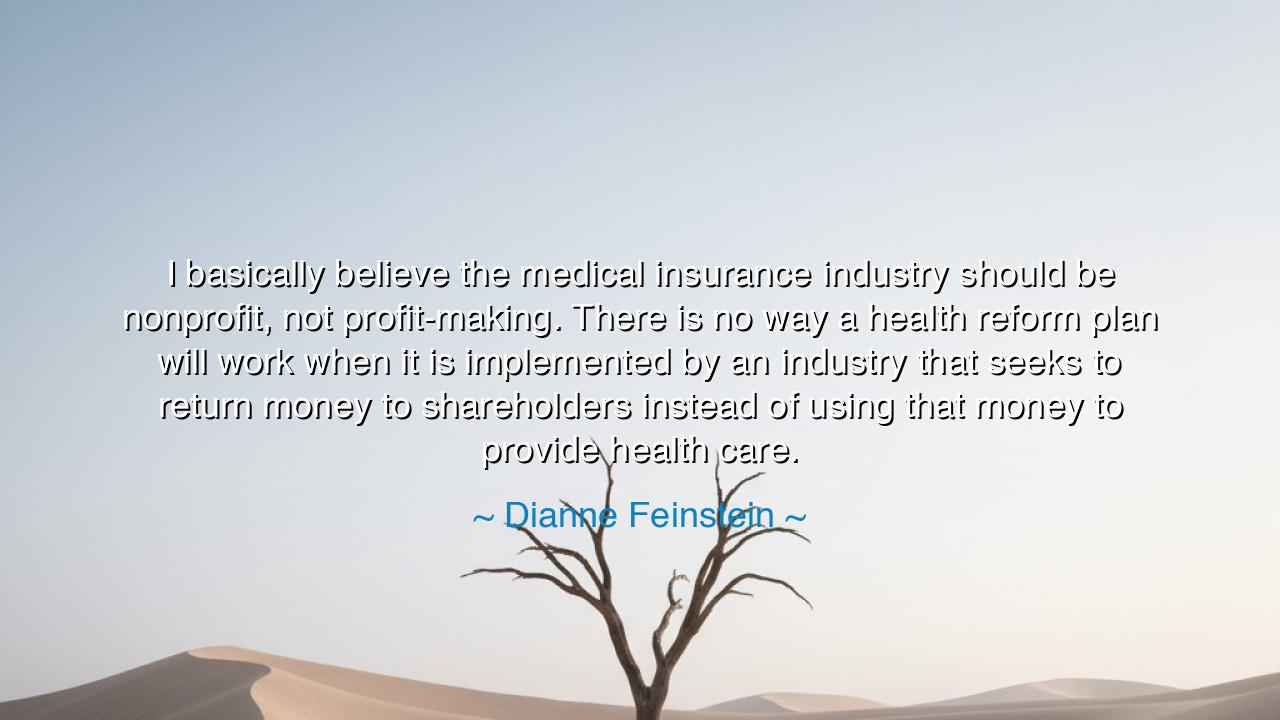
I basically believe the medical insurance industry should be
I basically believe the medical insurance industry should be nonprofit, not profit-making. There is no way a health reform plan will work when it is implemented by an industry that seeks to return money to shareholders instead of using that money to provide health care.






In the labyrinth of human affairs, there are few forces as profound and enduring as the question of justice. Among the most sacred duties we owe to one another is the right to health—a right that, when corrupted by profit, undermines the very fabric of a just society. Dianne Feinstein, in her timeless wisdom, speaks of this issue when she says, "I basically believe the medical insurance industry should be nonprofit, not profit-making. There is no way a health reform plan will work when it is implemented by an industry that seeks to return money to shareholders instead of using that money to provide health care." This truth, though deeply rooted in modern discourse, has echoes in the words of the ancients, who believed that justice must be at the heart of all systems designed to serve the people.
In the ancient world, the wise leaders understood that the common good must always take precedence over personal gain. Plato, in his Republic, spoke of a society governed not by the greed of the few but by the wisdom and fairness of the many. His ideal city was one where the needs of the people were placed above the desires of the powerful, for he knew that a society built on the pursuit of wealth would ultimately be a society marked by inequality and suffering. When Feinstein speaks of the medical insurance industry, she echoes this ancient wisdom: no true reform can take root when the moral foundation of the system is built on the pursuit of profit rather than on the service of humanity.
The rise of healthcare systems in the modern world has largely been driven by commercial interests—an approach that has often led to inequities in access to care. America’s healthcare system, in particular, has long been marked by a struggle between private interests and the public good. As Feinstein points out, the mission of healthcare should be to heal, not to generate profit for shareholders. The ancient Greeks believed in the noble pursuit of knowledge for the benefit of all, and similarly, healthcare must be viewed not as a commodity to be sold, but as a sacred service to preserve life and well-being.
One need not look far for examples of societies where the pursuit of profit in healthcare has led to failure. Consider the history of socialized medicine in nations like the United Kingdom and Canada, where the government bears the responsibility for ensuring the health of the people. These systems, though far from perfect, reflect the ethic of serving the common good, ensuring that no individual is left behind due to their inability to pay. By contrast, in systems where profit drives the industry, the gulf between the privileged and the disadvantaged grows ever wider, leaving many without access to the care they need.
Feinstein’s call for nonprofit healthcare is not a call for charity, but for justice. To put healthcare under the control of those whose primary aim is profit is to betray the very essence of what it means to be human. When healthcare is reduced to a transaction, it becomes less about healing and more about exploitation. The ancient wisdom of Confucius reminds us that the well-being of the people is the cornerstone of good governance. In this, healthcare reform should not be about business models, but about moral duty: the duty to care for one another, to ensure that all are given the chance to live healthy and fulfilling lives.
The lesson here, then, is one of accountability. In our modern world, we must ask ourselves: who are we serving with our healthcare systems? Are we serving the people, or are we serving profits? The challenge of healthcare reform is not merely a matter of policy, but of moral clarity. Feinstein’s call is a call to action, urging us to build systems that prioritize compassion, equality, and access over the insatiable drive for profit. A truly just society does not leave the health of its people in the hands of those seeking to enrich themselves, but rather places it in the hands of those who are committed to the well-being of all.
In your own life, reflect on the values you hold dear and ask how they align with the systems you participate in. Support policies and actions that serve the common good, that ensure that healthcare is seen not as a luxury for the few but as a right for all. Advocate for those who cannot speak for themselves, and stand firm against the forces that seek to turn life and death into mere transactions. Through such action, we honor the ancient wisdom of those who came before us, creating a world where healthcare is not a commodity, but a human right, a testament to our collective duty to care for each other.






AAdministratorAdministrator
Welcome, honored guests. Please leave a comment, we will respond soon